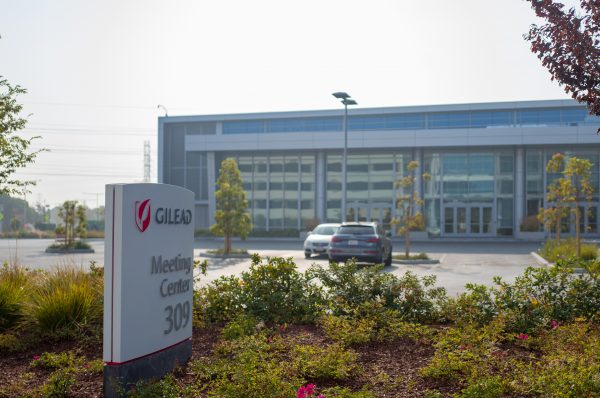
Data from Gilead Sciences’ two Phase III trials of the investigational Covid-19 drug remdesivir are anticipated to come out this month or next. Some early results have already trickled into the public domain, providing snapshots that, while limited, have nevertheless sent the company’s shares soaring. But medical experts and other observers have urged caution.
On April 10, the Foster City, California-based company announced data on 53 patients with severe disease who had received the drug under compassionate use protocols, with many seeming to benefit from it. And on Thursday, even more explosive news emerged as STAT reported on a video recording that had been leaked in which an investigator from a site that had enrolled 125 patients in the Phase III trials discussed anecdotal results indicating that the drug appeared effective, and mostly in patients with severe disease.
Although Gilead’s shares fell slightly after the compassionate use data were announced, in response to the Thursday report, shares were up more than 11% on the Nasdaq when markets opened Friday.
But while those early results may provide a glimmer of hope, clinical trial investigators and also investment bank analysts – not to mention the STAT reporters and even Gilead itself – have emphasized their limitations.
The recent experience with the malaria drugs hydroxychloroquine and chloroquine illustrates the potential dangers of getting too excited about early data. President Donald Trump’s promotion of hydroxychloroquine as a potential “game-changer” following the publication of data from a small clinical study that has since garnered criticism for methodological flaws sparked a run on the drugs, making it hard for people who need them for diseases like lupus to obtain them. The Food and Drug Administration later granted the drugs an emergency use authorization for Covid-19 in a move that has been cited as a potential blight on the agency’s reputation. And the popularity they have gained through all the publicity has even made it harder to enroll patients in the Phase III remdesivir trials at some sites. And the overall picture from clinical experience of the two drugs has been mixed, with positive results from some small studies offset by negative results from others and some studies stopped due to excessive toxicity.
In the case of remdesivir, the leaked Phase III data look encouraging on the surface, but there are also many unknowns, and the data being anecdotal and coming from an open-label study makes contextualization a challenge, wrote RBC Capital Markets analyst Brian Abrahams, in a note to investors responding to the STAT report. Details – like who among the 113 patients from the severe study are ventilated versus non-ventilated – are limited, and the severe-disease study in particular lacks a control arm. Data from the moderate-disease study, he wrote, provides the best opportunity for a true read on the drug’s efficacy.

A Deep-dive Into Specialty Pharma
A specialty drug is a class of prescription medications used to treat complex, chronic or rare medical conditions. Although this classification was originally intended to define the treatment of rare, also termed “orphan” diseases, affecting fewer than 200,000 people in the US, more recently, specialty drugs have emerged as the cornerstone of treatment for chronic and complex diseases such as cancer, autoimmune conditions, diabetes, hepatitis C, and HIV/AIDS.
According to the STAT article, by Matthew Herper and Adam Feuerstein, the University of Chicago Medicine had seen patients treated with remdesivir experience rapid recovery, with the vast majority discharged from the hospital in less than a week. In the compassionate use data, nearly 70% of patients with severe complications of the disease showed clinical improvement.
Still, experts have greeted early data on the drug at most with cautious optimism.
Regarding the compassionate use data, one Phase III study investigator, Dr. Prashant Malhotra, lead investigator for the studies for Northwell Health’s Feinstein Institutes for Medical Research, saw in them a potentially promising signal, but left open the possibility that the reported clinical benefit may be due to chance.
“It’s a very limited number, and it’s not a randomized, controlled trial, but it gives the signal that remdesivir may have a beneficial effect as far as its efficacy in treating the virus,” Malhotra said in a phone interview. Indeed, he added, the numbers reported in the compassionate use program are better than what has been generally seen among hospitalized patients with Covid-19.
Another Phase III investigator, Boston-based Tufts Medical Center infectious disease physician Dr. Debra Poutsiaka, said a possible reason for the patients’ improvement could be that supportive care for Covid-19 might have improved, and without a comparator arm, it’s impossible to say if the patients wouldn’t have improved on their own.
“As the pandemic progresses, we are learning more and more how to take care of these patients,” Poutsiaka said. “So the early experience may be different from the current experience.”
Photo: Tomsmith585, Getty Images












